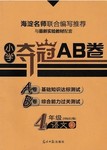题目内容
【题目】 If someone asks you how you can make you always 【1】_____
happy, you will perhaps find rather difficult to give him 【2】_____
a proper answer. Did you remember the old saying “No 【3】_____
human being can really happy who is not giving or trying 【4】_____
to give happiness to others?” If you will always think of 【5】_____
taking more from others and give them less, you won’t be 【6】_____
able to have happiness in your life even you are very rich. 【7】_____
Here’s an article for you. If each of you follow it, there 【8】_____
will be all end of many unhappy days of yours. So you should 【9】_____
learn to give up your own interests when necessarily to do so. 【10】_____
【答案】【1】将always前的you改为yourself
【2】 find后加it
【3】 Did改为Do
【4】 really前加be
【5】 去掉will
【6】 give改为giving
【7】 even后加if/though;或者even改为though/although
【8】follow改为follows
【9】 正确
【10】 necessarily改为necessary
【解析】【1】 考查反身代词的用法。此处需掌握短语make oneself happy使自己高兴。
【2】 考查it作形式宾语。此处it是形式宾语,真正的宾语时后面的不定式短语。
【3】 考查动词时态。根据文意应用一般现在时。
【4】 考查谓语动词。此处形容词happy前缺谓语动词be。
【5】 考查动词时态。在条件状语从句中用一般现在时代替一般将来时。
【6】 考查动名词。此处and前后为并列关系,故将give改为其动名词形式。
【7】 考查状语从句的连接词。
【8】 考查主谓一致。此句的主语是each,故谓语动词用单数形式。
【9】 正确
【10】 考查be necessary to do的结构。

 小学夺冠AB卷系列答案
小学夺冠AB卷系列答案